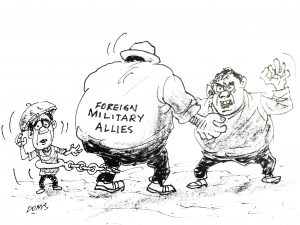The recent surge in our country’s military alliances with foreign powers carries significant implications not only for the security landscape of the region but also the sovereignty and diplomatic relations of the Philippines. Forging alliances can enhance our defense capabilities and deter potential aggressors, but we must take these partnerships cautiously to safeguard our national interests and maintain regional stability.
These growing military alliances underscore the Philippines’ strategic imperative to bolster its defense capabilities in response to increasing geopolitical tensions. Since China is challenging the country’s territorial claims in the West Philippine Sea, strengthening military alliances can provide us with much-needed support and leverage in asserting our sovereignty. Enhanced military cooperation, including joint exercises and intelligence sharing, can bolster the Philippines’ deterrence posture and contribute to regional peace and stability.
However, the deepening military ties with foreign powers raise concerns about potential entanglements and compromises to Philippine sovereignty. While alliances offer security benefits, they also entail commitments and dependencies that could limit the country’s autonomy in decision-making. The Philippines must tread carefully to ensure that its partnerships do not undermine its national interests or embroil it in conflicts, not of its own making. Maintaining a delicate balance between leveraging external support and safeguarding sovereignty is paramount in exercising international relations.
These evolving military alliances have broader geopolitical ramifications that extend beyond the region. As the dynamics of power play out in the Indo-Pacific, the country’s strategic alignments could influence the geopolitical landscape and shape the contours of regional security architecture. By partnering with like-minded countries that uphold the principles of international law and respect for sovereignty, the Philippines can contribute to a rules-based order that promotes peace and stability in the region.
Nevertheless, the Philippines must guard against the risk of escalating tensions and conflicts through its military alliances. While deterrence is essential, it should not come at the expense of dialogue and diplomatic engagement. The pursuit of peaceful resolution to disputes in the West Philippine Sea remains paramount, and military alliances should complement, rather than overshadow, diplomatic efforts aimed at ensuring mutual trust and cooperation among regional stakeholders.




